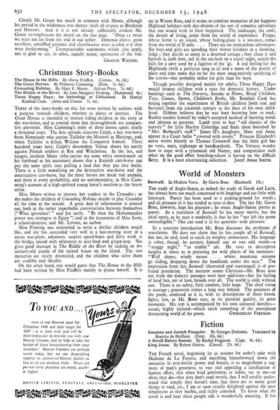Christmas Story -Books
The House in the Hills. By Olivia FitzRoy. 8s. 6d.) Kemball Cook. (Allen and Unwin. 7s. 6d.)
THREE of the story-books on this list were written by authors with a purpose towards children, whether to please or instruct. The Great Horses is intended to interest riding children in the story of the war-horse, and to remind them that thoroughbreds are compara- tive parvenus. Miss Cumming's story of three horses spans nearly a thousand years. The first episode concerns Calph, a bay war-horse from Normandy who carries Taillefer the Minstrel at Hastings, and, when Taillefer is killed, William the Conqueror himself. Three hundred years later, Calph's descendant Valour shows his mettle against French soldiers at Rye and Winchelsea. In the last, and longest, incident Major (who carries the same white sword-mark on his forehead as his ancestors) shows that a Kentish cart-horse can put the same spirit into pulling a load that they put into battle. There is a little moralising on the destructive war-horse and the constructive cart-horse, but the three horses are made real animals, and there is every probability, and no sentimentality, in Miss Cum- ming's account of a high-spirited young horse's reaction to the heavy collar.
Miss Moore wishes to interest her readers in the Crusades ; so she makes the children of Crusading Holiday decide to play Crusades all the time at the seaside. A great deal of information is poured out, both in the rather improbable conversations between themselves (" What ignorance! " said Joe tartly. " By then the Mohammedan power was strongest in Egypt ") and in the lecturettes of Miss Scott, a school-mistress, and Mr. Levens, an author.
Miss Fleming was concerned to write a thriller children would like, and she has succeeded very well in a fast-moving story of a secret war-plant, saboteurs, suspect speed-boats and dirty work at the bridge, spiced with references to nice food and ginger-pop. She gives good measure in The Riddle of the River by tacking on the century-old puzzle of the ruined house on the island. The two mysteries are neatly dovetailed, and the children who solve them are credible and likeable.
On the other hand, one would guess that The House in the Hills had been written by Miss FitzRoy mainly to please herself. It is set in Wester Ross, and it seems to combine memories of the happiest Highland holidays with day-dreams of the sort of romantic adventure that one would wish to have happened. The landscape, the croft, the details of living, come from the world of experience. Fergus, whose home is an island, whose hiding-place is a sea-cave, comes from the world of If only. . . . There are no tremendous adventures. Six boys and girls are spending their winter holidays in a shooting- lodge ; they decide to camp in a deserted cottage ; they clean it and furnish Lt, stalk deer, sail in the sea-loch on a starry night, search the hills for a cave used by a fugitive of the '45. A real feeling for the Highlands (with a patrician tang to it) and a sense of the poetry of place and time make this by far the most imaginatively satisfying of the stories—but probably rather for girls than for boys.
Though possibly designed mainly for adults, Those Happy Days would interest children with a taste for domestic history. Under headings such as The Nursery, Sunday at Home, Royal Children, Toys, Games, Sports, Children's Books, Mr. Kemball Cook has strung together the experiences of British children (both real and fictional) from the sixteenth century to the days of his own child- hood. Gibbon believes that he was born knowing how to read ; Ruskin teaches himself by today's accepted method of learning words and phrases as patterns. Lamb tries to buy " old classics of the nursery " for little Hartley Coleridge and finds them banished by " Mrs. Barbauld's stuff." James II's daughters, Mary and Anne, appear in a Court ballet "covered with jewels." Princess Elizabeth's nurse writes bitterly to Thomas Cromwell that the little girl has no vests, stays, nightcaps or handkerchiefs. The Verneys wonder how to cope with a tyrannical old Nanny, and congratulate each other on the good effect boarding-school is having on the difficult Betty. It is a most entertaining collection. JANET ADAM SMITH.


































 Previous page
Previous page